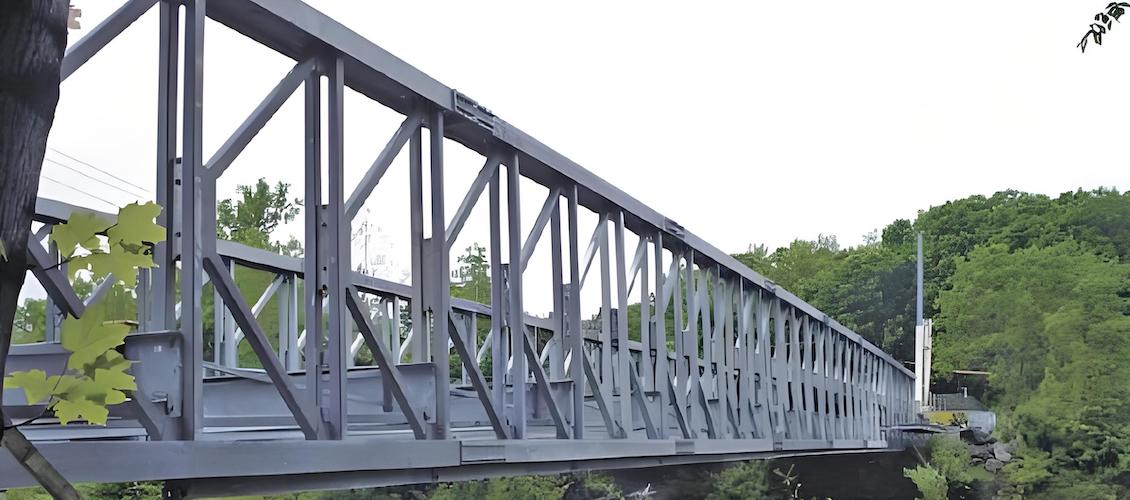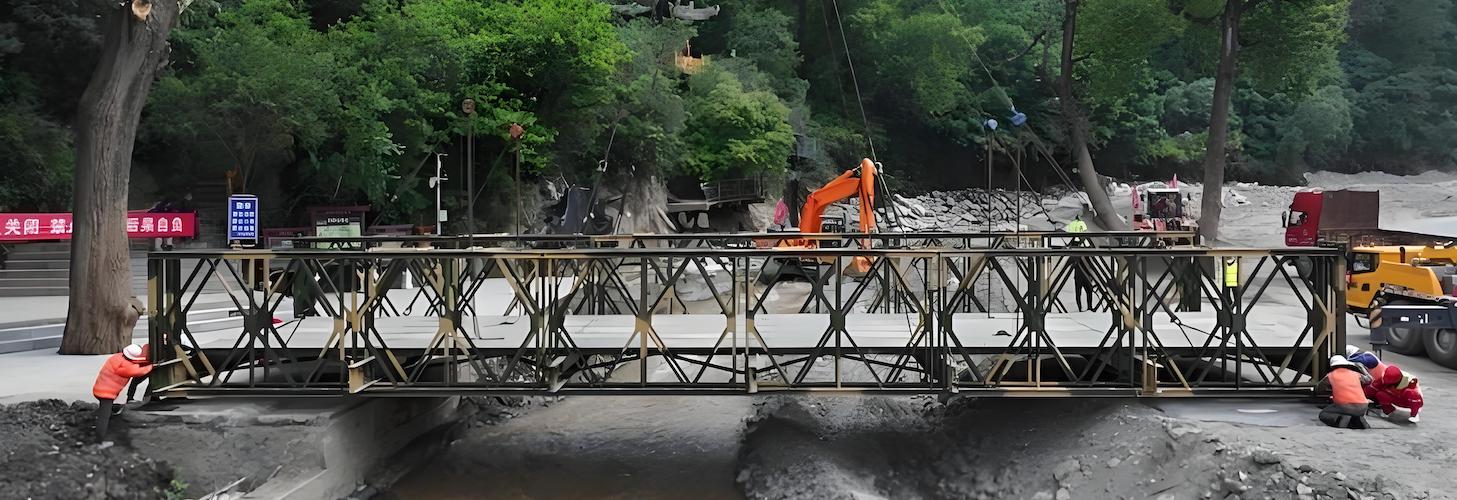Views: 211 Author: Site Editor Publish Time: 2025-11-03 Origin: Site









Content Menu
● EVERCROSS BRIDGE: A Leader in Modular Steel Bridge Manufacturing
>> Overview of EVERCROSS BRIDGE
● Other Leading Modular Bridge Manufacturers in Spain
>> ACCIONA
>> Ferrovial
>> Sacyr
● Advantages of Modular Steel Bridges
>> Flexibility and Adaptability
● Future Trends in Modular Bridge Manufacturing
>> Increased Demand for Custom Solutions
● Frequently Asked and Questions regarding Modular Steel Structure Bridge Manufacturers
>> 1. How do Spanish regulations impact the design and construction of modular steel bridges?
>> 2. What are some innovative modular steel bridge projects recently completed in Spain?
>> 3. What are the environmental benefits of using modular steel bridges?
>> 4. How does the installation process of modular steel bridges differ from traditional bridges?
Modular steel bridges are becoming increasingly popular due to their efficiency, cost-effectiveness, and adaptability. In Spain, several manufacturers are leading the way in this innovative field. Among them, EVERCROSS BRIDGE stands out as a top player, known for its high-quality production and extensive collaboration with major enterprises. This article will explore the top modular steel structure bridge manufacturers in Spain, highlighting their contributions to the industry.
Founded with a vision to revolutionize bridge construction, EVERCROSS BRIDGE has established itself as one of the top three manufacturers in China, producing over 10,000 tons of steel bridges annually. The company has built a strong reputation for its commitment to quality and innovation, making it a preferred partner for large-scale projects. With a focus on advanced engineering and design, EVERCROSS BRIDGE has successfully completed numerous projects both domestically and internationally, showcasing its ability to meet diverse client needs. The company’s strategic partnerships with major enterprises such as China Communications Construction Company and China Railway Group further enhance its credibility and market presence.
EVERCROSS BRIDGE specializes in a variety of modular steel bridge designs, including truss bridges, arch bridges, and pedestrian bridges. Their products are designed to meet diverse needs, from urban infrastructure to rural applications. The company utilizes advanced manufacturing techniques to ensure that each bridge is not only durable but also easy to install. This versatility allows EVERCROSS BRIDGE to cater to a wide range of projects, from temporary structures for emergency situations to permanent installations that require long-term durability. The incorporation of innovative materials and construction methods also ensures that their bridges can withstand various environmental conditions, making them suitable for different geographical locations.
Quality is at the forefront of EVERCROSS BRIDGE's operations. The company adheres to strict international standards and employs a rigorous quality control process throughout the manufacturing cycle. This commitment ensures that their bridges can withstand the test of time and meet the safety requirements of various projects. EVERCROSS BRIDGE invests heavily in research and development to continuously improve its products and processes. By leveraging cutting-edge technology and skilled craftsmanship, the company ensures that every bridge not only meets but exceeds industry standards. This dedication to quality has earned EVERCROSS BRIDGE numerous certifications and accolades, further solidifying its position as a leader in the modular bridge manufacturing sector.
ACCIONA is a global leader in sustainable infrastructure and renewable energy. The company has made significant strides in modular bridge construction, focusing on innovative technologies that enhance efficiency and reduce environmental impact. Their modular bridges are designed for quick assembly and disassembly, making them ideal for temporary and permanent applications. ACCIONA's commitment to sustainability is reflected in its use of recycled materials and energy-efficient manufacturing processes. The company actively seeks to minimize its carbon footprint, aligning its operations with global sustainability goals. Additionally, ACCIONA's extensive experience in large-scale infrastructure projects allows it to deliver complex modular bridge solutions that meet the specific needs of clients across various sectors.
Ferrovial is another prominent player in the Spanish construction sector, known for its engineering expertise and global reach. The company has developed several modular bridge solutions that cater to both urban and rural environments. Ferrovial's commitment to sustainability is evident in their use of eco-friendly materials and practices in bridge construction. The company employs advanced modeling and simulation techniques to optimize bridge designs, ensuring that they are not only functional but also aesthetically pleasing. Ferrovial's modular bridges are often integrated into larger infrastructure projects, enhancing connectivity and accessibility in urban areas. Their focus on innovation and quality has positioned Ferrovial as a trusted partner for governments and private entities alike.
Sacyr is a major construction and engineering company in Spain, recognized for its extensive portfolio of infrastructure projects. The company has embraced modular construction techniques to enhance the speed and efficiency of bridge building. Sacyr's modular bridges are designed to meet the specific needs of each project, ensuring optimal performance and durability. By utilizing prefabricated components, Sacyr can significantly reduce construction time and costs, making their solutions attractive for both public and private sector clients. The company also emphasizes collaboration with local communities, ensuring that their projects align with regional development goals and contribute positively to the surrounding environment.
Grupo Puentes specializes in the design and construction of bridges, with a strong focus on modular solutions. The company has successfully completed numerous projects across Spain, showcasing their ability to deliver high-quality bridges that meet stringent safety standards. Their innovative approach to modular bridge design allows for flexibility in construction and adaptability to various site conditions. Grupo Puentes is committed to using the latest technology in bridge design and construction, which enables them to create structures that are not only functional but also visually appealing. Their dedication to customer satisfaction and quality assurance has earned them a solid reputation in the industry.
Estructuras Metálicas is a well-established manufacturer of steel structures, including modular bridges. The company prides itself on its engineering capabilities and commitment to quality. Estructuras Metálicas offers a range of modular bridge solutions that are tailored to meet the unique requirements of each project, ensuring both functionality and aesthetic appeal. Their bridges are designed with an emphasis on safety and durability, utilizing high-quality materials and advanced construction techniques. Estructuras Metálicas also focuses on continuous improvement and innovation, regularly updating their designs and processes to stay ahead of industry trends.
One of the primary benefits of modular steel bridges is their rapid installation. These bridges are prefabricated off-site, allowing for quick assembly on location. This reduces construction time significantly, minimizing disruption to traffic and surrounding areas. The ability to install modular bridges in a fraction of the time compared to traditional methods makes them particularly advantageous for projects with tight deadlines or in areas with heavy traffic. Additionally, the reduced need for extensive on-site construction activities lowers the risk of accidents and enhances overall safety during the installation process.
Modular bridges are often more cost-effective than traditional bridge construction methods. The reduced labor costs and shorter construction timelines contribute to overall savings. Additionally, the ability to reuse modular components can further lower expenses for future projects. By streamlining the construction process and minimizing waste, modular bridge manufacturers can offer competitive pricing without compromising on quality. This cost-effectiveness makes modular bridges an attractive option for municipalities and organizations looking to maximize their infrastructure budgets while still delivering high-quality solutions.
Modular steel bridges can be designed to fit a variety of site conditions and requirements. Their modular nature allows for easy customization, making them suitable for different spans and load capacities. This flexibility is particularly advantageous in urban environments where space and design constraints may exist. Modular bridges can be adapted to accommodate various traffic loads, environmental conditions, and aesthetic preferences, ensuring that they meet the specific needs of each project. This adaptability also allows for easier maintenance and upgrades, as individual components can be replaced or modified without the need for extensive renovations.
The use of modular construction techniques promotes sustainability in bridge building. By minimizing waste and utilizing eco-friendly materials, manufacturers can reduce the environmental impact of their projects. Furthermore, the ability to disassemble and relocate modular bridges contributes to a more sustainable approach to infrastructure development. Many manufacturers are also exploring the use of renewable energy sources in their production processes, further enhancing the sustainability of modular bridge construction. This focus on environmental responsibility aligns with global efforts to combat climate change and promote sustainable development practices across various industries.
As technology continues to evolve, the modular bridge manufacturing industry is likely to see significant advancements. Innovations in materials, design software, and construction techniques will enhance the efficiency and performance of modular bridges. Manufacturers are increasingly adopting smart technologies to monitor the structural integrity of bridges, ensuring safety and longevity. The integration of Building Information Modeling (BIM) and other digital tools allows for more precise planning and execution, reducing errors and improving overall project outcomes. These technological advancements will not only streamline the construction process but also enhance the functionality and durability of modular bridges.
With the growing complexity of infrastructure projects, there is an increasing demand for customized modular bridge solutions. Manufacturers are focusing on developing tailored designs that meet the specific needs of clients, whether for urban transit systems or rural access roads. This trend is driven by the need for more efficient and effective infrastructure solutions that can adapt to changing demands and conditions. As clients seek more personalized approaches to bridge design, manufacturers will need to invest in research and development to create innovative solutions that address these unique challenges.
The push for sustainable construction practices is expected to shape the future of modular bridge manufacturing. Companies will continue to explore eco-friendly materials and processes, aiming to reduce the carbon footprint of their projects. This trend aligns with global efforts to combat climate change and promote sustainable development. Manufacturers are likely to prioritize the use of recycled materials, energy-efficient production methods, and designs that minimize environmental impact. As sustainability becomes a key consideration in infrastructure development, modular bridge manufacturers will play a crucial role in advancing these initiatives and contributing to a greener future.
The modular steel bridge manufacturing industry in Spain is thriving, with companies like EVERCROSS BRIDGE leading the charge. Their commitment to quality, innovation, and sustainability sets a high standard for the industry. As technology advances and the demand for efficient infrastructure solutions grows, the future of modular bridge construction looks promising. With a focus on customization and sustainability, these manufacturers are well-positioned to meet the challenges of modern infrastructure development. The continued evolution of modular bridge technology and practices will not only enhance the efficiency of construction but also contribute to the creation of safer, more sustainable infrastructure for communities across Spain and beyond.

Spanish regulations require that all bridges meet strict safety and environmental standards. This includes compliance with the European Union's construction directives, which mandate rigorous testing and certification processes. Modular bridge manufacturers must ensure that their designs adhere to these regulations, which can influence material selection, structural design, and construction methods.
Recent innovative projects include the construction of pedestrian bridges in urban areas, such as the pedestrian bridge in Madrid, which features a unique design that integrates with the surrounding landscape. Another notable project is the modular bridge built for emergency access in rural areas, showcasing the versatility and rapid deployment capabilities of modular construction.
Modular steel bridges offer several environmental benefits, including reduced waste during construction, the ability to use recycled materials, and lower carbon emissions due to shorter construction times. Additionally, their modular nature allows for easy relocation and reuse, minimizing the environmental impact of infrastructure development.
The installation process for modular steel bridges is significantly faster than that of traditional bridges. Modular components are prefabricated off-site and then transported to the installation location, where they can be assembled quickly. This contrasts with traditional bridges, which often require extensive on-site construction and longer timelines, leading to greater disruption and higher labor costs.
